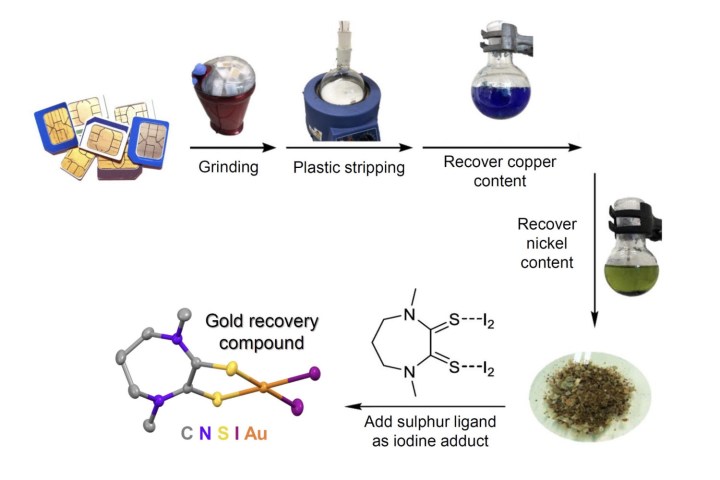Electronic gadgets are a potpourri of pricey and rare elements, but a majority of them end up piling up in an e-waste landfill instead of being recycled. That’s not because we lack the tech to recycle it, but due to factors like cost management and process efficiency. SIM cards are among the phone parts that end up going to waste without much uptake in terms of recycling efforts.
Now, the folks over at Imperial College London have devised a method of recycling SIM cards that can potentially help make medicines cheaper. In a world where health care accessibility is in crisis mode — especially in the U.S., where people pay the highest price globally at $1,300 per year on medicines – this encouraging SIM recycling method targeted at the pharmaceutical industry could be a godsend.
It’s all about that gold

At the heart of this promising solution is gold — a gold compound, to put it precisely. SIM cards employ gold coating because it is an excellent conductor of electricity. Plus, it resists corrosive damage over time much better than other precious metals, such as silver. The quantity used, however, is quite small, and you would have to collect thousands of SIM cards to extract a few grams of gold.
That’s not a very economically sound process, both at an individual level as well as an industrial scale. The biggest problem is the extraction methods, which are complex and expensive. In response, professors Angela Serpe and Paola Deplano at the University of Cagliari in Italy developed an easy method of recovering gold and other precious metals from electronics.
So, how does it play into the business of making medicines? Well, gold also happens to be an excellent catalyst, which means it can speed up the process of chemical reactions. The process mentioned above relies on grinding, plastic stripping, and chemically treating the e-waste to recover gold in a compound form, which isn’t really as precious as the blingy metal itself.

In fact, the gold compound produced at the end of the process won’t easily yield pure gold for reuse in electronic circuit boards. This is where a few minds from Imperial College London came up with a solution. Led by professors James Wilton-Ely and Chris Braddock, they found a way to use this recycled gold compound as a catalyst for pharmaceutical applications.
How all of this works
The team applied the gold compound as a catalyst in multiple chemical reactions for making medicines such as pain-relief and anti-inflammatory drugs. To their surprise, the gold “waste: at their hand “performed as well, or better, than the currently used catalysts.”
Another major discovery was that this gold compound derived from waste SIM cards could also be reused, which further adds to its cost-efficiency appeal. A research paper, which is now available in ACS Publications, says, “this is the first direct application in homogeneous catalysis of gold recovery products sourced from e-waste.”

This low-impact recovery process for obtaining gold as a catalyst from discarded SIM cards and other waste electrical and electronic equipment is not only more economical, but also far more environmentally sustainable than commercial mining.
Leftover SIMs = cheaper meds
The paper adds that “even unoptimized, small-scale production” of the gold catalyst, which is obtained in the form of a black crystalline solid, is significantly cheaper than the traditional options currently being used in the pharmaceutical industry. Of course, it is also far less damaging to the environment than gold mining operations.
Even after the gold compounds are used as catalysts during a medicine synthesis batch, and are recovered using a simple chemical process, they are free of any organic impurities. To put it simply, they can be used for catalyzing medicine production processes up to eight times without any loss in their effectiveness.

The team concludes that conventional gold catalysts can be substituted with “more sustainable and cheaper alternatives recovered from millions of metric tons of e-waste currently sent to landfill each year.” With mass adoption, benefits derived from this breakthrough could very well be passed to the pharmaceutical industry to make medicines more affordable.
In times when even the White House had to intervene with an executive order to lower the price of prescription drugs, the world could definitely use innovations like this one. Another notable project aimed at recycling SIM cards came from the Kids Non-Profit Organization (KNPO), which used recycled SIM cards to make safety reflectors. The goal was to use them to prevent road accidents.
Editors' Recommendations
- Google is launching a powerful new AI app for your Android phone
- Here are Apple’s secret plans for adding AI to your iPhone
- Before you buy an iPhone 15 Pro case, make sure it has this one thing
- Check your Apple Card right now — you may have a crazy 10% cash-back promo
- Your phone may make a loud sound today — here’s why




